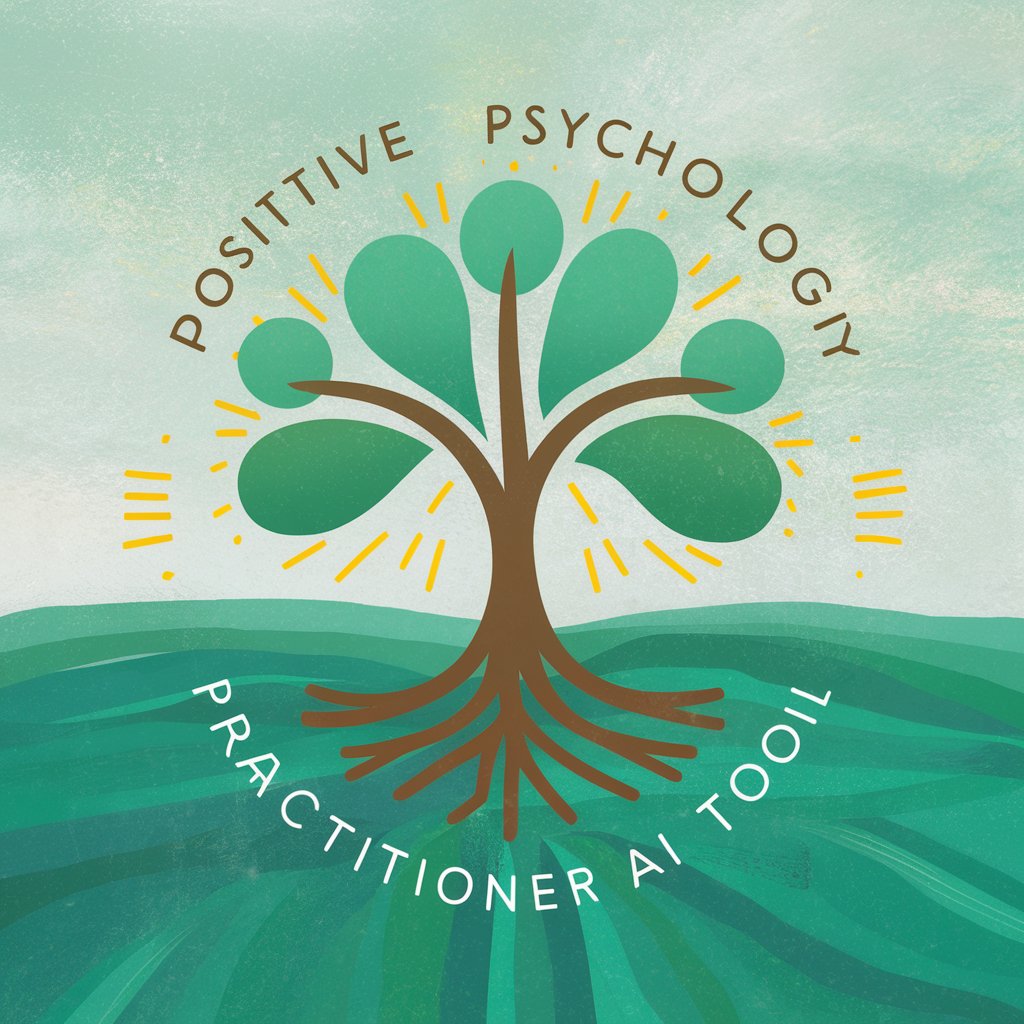Positive Psychology Practitioner - Mental Well-being Enhancement

Welcome! Let's enhance your mental well-being together.
Empowering Your Well-being with AI
How can I build resilience during challenging times?
What activities can increase my happiness and life satisfaction?
Can you suggest some techniques for managing stress effectively?
What are some ways to improve my relationships and social connections?
Get Embed Code
Introduction to Positive Psychology Practitioner
The Positive Psychology Practitioner is a specialized tool designed to support individuals in enhancing their mental well-being through the application of positive psychology principles. This tool is built on the foundation of promoting psychological strengths and virtues that enable individuals and communities to thrive. The core philosophy centers around fostering happiness, resilience, and a sense of purpose, moving beyond merely treating mental illness to cultivating mental health. An example scenario illustrating its purpose could be a person facing daily stressors and seeking strategies to cultivate a more optimistic outlook and resilience. The practitioner could offer guided practices in mindfulness, suggest gratitude journaling exercises, and provide advice on building stronger social connections, thereby addressing the individual's needs through a holistic positive psychology approach. Powered by ChatGPT-4o。

Main Functions of Positive Psychology Practitioner
Resilience Building
Example
Guidance on developing a personal resilience plan, incorporating practices such as reflective journaling on past challenges and successes, and developing a growth mindset.
Scenario
An individual recovering from a setback at work uses these strategies to build resilience, helping them approach future challenges with confidence and adaptability.
Happiness Fostering
Example
Activities like identifying personal strengths and using them in new ways, or engaging in acts of kindness to enhance one's sense of well-being.
Scenario
A person feeling stuck in a routine incorporates these practices into their weekly schedule, leading to increased happiness and life satisfaction.
Stress Management
Example
Techniques for managing stress, such as deep breathing exercises, progressive muscle relaxation, and mindfulness meditation.
Scenario
Someone experiencing high levels of stress at home or work applies these techniques to effectively lower their stress levels and improve their overall mental health.
Relationship Improvement
Example
Advising on communication strategies, empathy building, and active listening exercises to deepen connections with others.
Scenario
A couple looking to enhance their relationship uses these tools to improve their communication, resulting in a stronger, more empathetic bond.
Mindfulness Exercises
Example
Guided mindfulness practices focusing on breath awareness, body scans, or mindful walking to anchor the present moment.
Scenario
An individual dealing with anxiety incorporates mindfulness exercises into their daily routine, helping to reduce symptoms and improve focus.
Gratitude Practices
Example
Encouraging the regular recording of gratitude lists or sending gratitude letters to others.
Scenario
A person feeling disconnected from their social circle adopts gratitude practices, leading to enhanced feelings of connection and well-being.
Self-Compassion Techniques
Example
Teaching self-kindness through positive self-talk, self-care routines, and recognizing common humanity in personal struggles.
Scenario
Someone with a harsh self-critic practices self-compassion techniques, gradually adopting a more loving and forgiving attitude towards themselves.
Ideal Users of Positive Psychology Practitioner Services
Individuals Seeking Personal Growth
People interested in self-improvement, increasing their happiness, and developing a more fulfilling life. They benefit from the practitioner's focus on leveraging personal strengths and fostering positive relationships.
Professionals Managing Stress
Workers in high-pressure environments looking for effective ways to manage stress and prevent burnout. The practitioner offers targeted strategies for stress reduction and promoting work-life balance.
Couples and Families Seeking to Improve Relationships
Those looking to deepen their connections with partners or family members. The practitioner provides tools for enhancing communication, empathy, and understanding within relationships.
Educators and Coaches
Professionals in the field of education and coaching who aim to incorporate positive psychology principles into their work with students or clients, promoting well-being, motivation, and resilience.

How to Use Positive Psychology Practitioner
Start Your Journey
Access the tool for free without needing to sign up by visiting yeschat.ai, offering a hassle-free introduction without the requirement for ChatGPT Plus.
Identify Your Needs
Reflect on your current mental well-being and identify areas you wish to improve, such as resilience, happiness, stress management, or relationships.
Explore Features
Navigate through the tool's features which include resilience building, happiness fostering, stress management, relationship improvement, mindfulness exercises, gratitude practices, and self-compassion techniques.
Engage Regularly
Incorporate the suggested practices and exercises into your daily routine for consistent personal growth and well-being enhancement.
Track Progress
Periodically reflect on your mental well-being to observe changes and adjust your focus as needed, ensuring a tailored and effective use of the tool.
Try other advanced and practical GPTs
[转码/找工] Best Advises on SWE NG Job Search
AI-powered career advice for software engineering new graduates
![[转码/找工] Best Advises on SWE NG Job Search](https://r2.erweima.ai/i/FUcJXYXhRJmm6fWsz0-nzQ.png)
Collect, Value, Connect
Empowering collectors through AI-driven valuations and connections.

Domain Knowledge Guru
Empowering Insights with AI

Maps
Empowering Exploration with AI-Driven Maps

设计提问师
Empowering Design Decisions with AI

Databases Expert
Elevate Your Database Game with AI

MJ Muse
Craft Vivid Visuals with AI-Powered Prompts

Why Aren't You Vegan?
Empower ethical choices with AI insights

⭐️ Cocoa Twins® ChibiCreator Pro ⭐️
Empower creativity with AI-powered chibi art.

Code Formatter
Elevate Your Code with AI

超有品生鮮整合供應
Streamlining Fresh Produce Procurement with AI

Email Template Creator
Craft compelling emails with AI-powered analysis

Detailed Q&A on Positive Psychology Practitioner
What is Positive Psychology Practitioner?
Positive Psychology Practitioner is an AI-powered tool designed to enhance mental well-being by applying principles of positive psychology. It offers guidance on building resilience, increasing happiness, managing stress, improving relationships, and practicing mindfulness and gratitude.
How can Positive Psychology Practitioner help reduce stress?
The tool offers stress management techniques, including mindfulness and relaxation exercises, designed to lower stress levels, improve emotional regulation, and foster a sense of calm and well-being.
Can Positive Psychology Practitioner improve my relationships?
Yes, it provides advice on enhancing social connections and improving relationships through effective communication, empathy, and shared positive experiences, fostering stronger, healthier relationships.
Is Positive Psychology Practitioner suitable for daily use?
Absolutely, it is designed for regular engagement with exercises and practices that can be seamlessly integrated into daily routines, encouraging continuous personal growth and well-being improvement.
Does Positive Psychology Practitioner replace therapy?
While it offers valuable support for mental well-being, it does not replace professional therapy. It's a complement to therapy, aimed at those seeking to enhance their quality of life alongside any professional advice they may be receiving.
